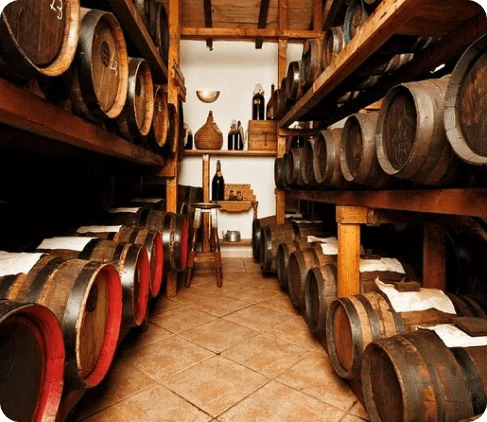Balsamic Vinegar
Balsamic Vinegar of Modena is an ancient product having been recorded in the royal archives of Emperor Henry II in 1046, when he gave some as a gift to Countess Matilde of Canossa.

At that time it was used as an elixir and the recipe was a secret, passed from father to son. Since then, Balsamic Vinegar has been known as a precious condiment with special therapeutic properties. Prepared using ancient traditional procedures, the process begins with careful selection of the Lambrusco and Trebbiano grapes. They are ideal for the high sugar content required for production.
These grapes are pressed and the resulting juice called “must” is heated in copper cauldrons until the volume is reduced through evaporation to about 40% of the original weight. The liquid is then decanted into wooden barrels (chestnut, oak, juniper and cherry) and left to age and transform into vinegar. As time goes by, part of the liquid evaporates and part of the liquid is absorbed into the wood. This is the moment called “rincalzo” which happens in the period of grape harvest. The liquid is transferred into smaller barrels while the new “must” is added to “top off” the bigger barrel. And so continues the process.
Our 25 Star Balsamic Vinegar FAQs
How many years is the 25 Star Balsamic aged?
In Italy, the only balsamic that is allowed to state an age is a DOP product. To obtain DOP status, the balsamic must be aged a minimum of 12 years and is controlled by the Consortium for approval and bottling into a unique 3.4 oz. bottle. These bottles usually cost between $75 and $120 each. There is only a small amount of this product produced each year. In fact an entire battery of barrels would result in approximately 5 liters of product.
Therefore, a new product was started called Balsamic Vinegar of Modena (today IGP). This commercial product is made from mixing concentrated or cooked grape must and wine vinegar and then aging this blend in wooden casks. There are two categories of age within the PGI regulation, the minimum required aging in wood is set forth at 2 months or at the second level of aging in wood for 3 years so according to PGI ruling, no balsamic can be said to be aged more than 3 years. In addition, all labels that bear the PGI logo, must be approved by the Third Party auditors of the PGI.
More important than the age in this type of balsamic is that the quality and the quantity of the grape must and the wine vinegar used in the production are crucial to the quality of the finished product.
Our 25 Star Balsamic has a minimum of 80% concentrated grape must and aged red wine vinegar.
Can the seal of PGI (Protected Geographical Indication) be put on the label of 25 Star Balsamic Vinegar?
The direct answer to your question is, no, you are not allowed to use the PGI seal on your label according to Italian law even though we authenticate that the product comes from Modena, Italy.
While Italian law does not necessarily have to be followed in the United States, Italy has asked that their PGI laws be extended to all countries. Currently, the PGI seal can only be put on products where the facility is audited by a third party auditor from Italy. Full trace ability is required which means that if we were to become certified, we would have to pay for an auditor to come from Italy and then we would have to account for every sale to every customer with the information regarding the sale.
Is there sugar added to your 25 Star Balsamic?
NO! The sweetness of our balsamic is due to the high amount of concentrated grape must in our product. The more grape must, the thicker and sweeter it becomes.
How does your 25 Star Balsamic compare to the “Up to 18 Year Old Balsamic” that is found in many olive oil stores?
First of all, if the product was truly that aged, the price would prohibit the average person from being able to afford it as would sell for about $25/ounce. Secondly, according to PGI rules, it could only be called “aged” if it is really a certified product. Condimento balsamic cannot be classified as PGI nor can it be claimed as aged under PGI rules.
We do not claim an age on our product as we follow the law and guidelines set in place by the consortium. However, we feel that our product stands for itself. We invite you to compare the products side by side and decide for yourself which product is superior.
What type of barrels is the 25 Star Balsamic aged in?
Slovanian Oak.
What makes your 25 Star Balsamic so thick?
Our special quality of grape must give the finished goods a thicker consistency This balsamic is made exclusively for us and to our specification. It contains a minimum of 80% high quality must and wine vinegar that is aged a minimum of 10 years. The resultant product is naturally thick and sweet.
